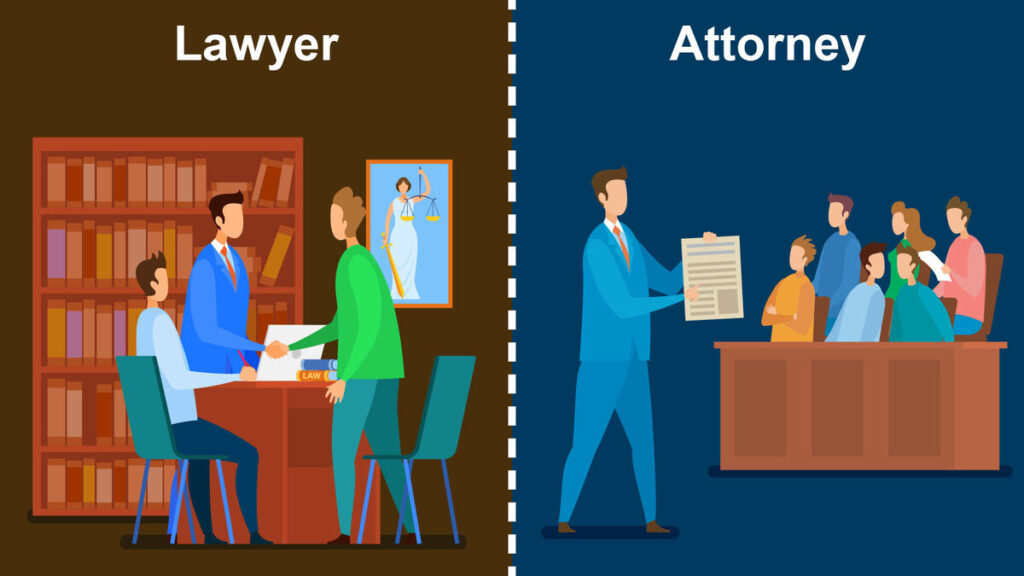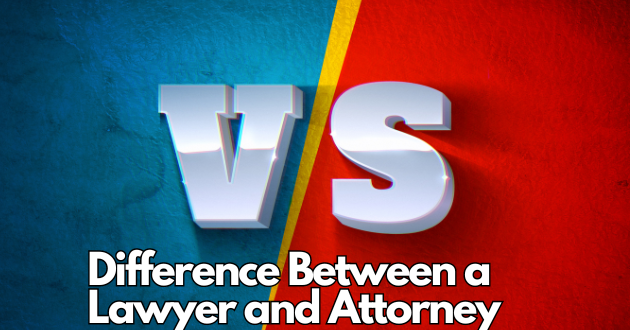Lawyer and attorney are frequently used interchangeably in the context of matters, but there is a subtle difference between a lawyer and attorney. It’s really important to grasp this differentiation whether you’re, in need of guidance assistance, in a courtroom setting or just looking to broaden your understanding of the law.
What is a Lawyer?
A lawyer is someone who offers guidance and legal representation to individuals, in matters pertaining to the law. They have undergone education and successfully completed a bar examination. Lawyers often focus on areas of law such, as civil cases. Their primary responsibility involves comprehending the intricacies of the law applying it to situations and advocating for their clients legal entitlements.

Are Lawyers Rich?
The notion that every lawyer is wealthy is a misconception. While certain lawyers, those, in law enjoy high incomes there are others who work in public service and earn more modest salaries. The financial success of a lawyer often relies on factors such, as their area of expertise where they practice law and the clientele they serve.
Are Lawyers Notaries?
In regions lawyers have the ability to serve as notaries. This grants them the authority to observe and authenticate the signing of documents. However it’s important to note that not all lawyers possess capabilities. The regulations surrounding this matter differ based on the country or state in question. In locations lawyers are required to undergo training in order to obtain notary status.
Are Lawyers Allowed to Lie?
Attorneys are bound by a code of ethics that prohibits them from engaging in dishonesty. They are expected to uphold principles of honesty and integrity. While they can employ approaches and present information favorably on behalf of their clients, falsehoods particularly in a courtroom setting are strictly forbidden and carry significant repercussions.
Are Lawyer Consultations Free?
Some attorneys provide consultations. During this meeting prospective clients can discuss their case. Gain insight, into the attorneys expertise. However it is worth noting that not all attorneys offer this service of charge. It is advisable to inquire about any consultation fees to arranging a meeting.
Are Lawyer Fees Deductible?
Lawyer fees can potentially be eligible, for deduction depending on the situation. For example fees paid for business related matters, employment affairs or certain types of tax issues might be eligible for deduction. However it’s important to note that personal legal fees are generally not deductible. It would be advisable to seek guidance from a tax professional, for advice in this matter.

Can Lawyers Practice in Any State?
Lawyers are not permitted to practice law in any state without licensing. They are required to obtain a license specific, to the state they intend to practice in. This typically entails passing the bar exam of that state. However some states have reciprocity agreements that enable lawyers, from states to practice without having to undergo another bar exam.
Can Lawyers Work from Home?
Lawyers have the flexibility to work remotely thanks, to advancements in technology. Numerous legal responsibilities, such, as research, writing and client consultations can be effectively carried out from home. However when it comes to court appearances physical presence is generally necessary unless virtual attendance is allowed by the court.
Can Lawyers Serve on Juries?
It is uncommon for lawyers to serve on juries due, to concerns, about their knowledge potentially influencing the decision making process. As a result during jury selection lawyers are frequently exempted from serving on juries in cases related to their area of expertise.
Can Lawyers Represent Family?
Lawyers have the ability to act as representatives, for their family members. It may not be the best course of action, in every situation. Representing a family member can create situations where conflicts of interest and emotional involvement arise, potentially impacting the lawyers ability to remain objective and make judgments. In cases it is advisable to seek legal representation instead.
Can Lawyers Represent Themselves?
Lawyers have the option to represent themselves in matters, which is commonly referred to as ” se” representation. However it’s quite common for seasoned lawyers to seek the assistance of lawyers to handle their cases. The reason, behind this is that personal involvement can potentially impact judgment and influence the outcome of the case.
Do Lawyers Make Good Money?
Lawyers have the potential to earn an income although the amount can differ greatly. Various factors such, as where they practice, their area of expertise and how long they’ve been practicing all come into play. It’s common for lawyers in urban areas to make more money compared to public defenders or lawyers working in rural regions. While there is potential for wealth in the field it’s not a guarantee, across the board.
Do Lawyers Work on Weekends?
Lawyers occasionally have to work on weekends depending on their workload and the specific demands of their profession. Lawyers who operate in practice or handle cases with time constraints may find themselves working beyond business hours including weekends.

Do Lawyers Give Advances on Settlements?
Typically lawyers are not allowed to provide payments, on settlements due to regulations, in many regions. However there are instances where lawyers might work on a contingency fee arrangement receiving a portion of the settlement or award once the case is fully resolved.
Does Lawyer Keep Copy of Will?
Lawyers typically retain a copy of their clients wills particularly if they were the ones who prepared them. This practice ensures both safekeeping and convenient accessibility whenever necessary. Nonetheless it is equally crucial for the client to possess their copy and inform trusted individuals, about its whereabouts.
Does the FBI Have Lawyers?
Yes the FBI does employ lawyers. These legal experts offer guidance on a range of issues such, as investigations, national security and internal affairs. Their primary responsibility is to ensure that the FBIs activities are in compliance, with the law.
Does the CIA Have Lawyers?
The CIA also has lawyers, on its staff. These legal professionals offer guidance on matters concerning intelligence and national security. Their role is to ensure that the CIA operates within the boundaries of both U.S. And laws providing legal advice, in intricate and delicate situations.
How Lawyers Select Jury Members?
Lawyers have a role, in selecting jurors by using a process called “voir dire.” They ask jurors questions to identify any biases or preconceptions they may have. The objective is to choose a jury that’s fair and unbiased. Both the defense and prosecution lawyers have the right to challenge jurors.
Where Lawyers Can Work?
Lawyers have the option to work in environments such, as law firms, corporations, government agencies, non profit organizations or, as independent practitioners. Some lawyers handle cases in courtrooms while others primarily deal with matters. The field of law provides a range of opportunities allowing individuals to pursue roles in advocacy or advisory capacities.
Why Lawyers Use Yellow Paper?
Lawyers frequently opt for pads due, to their eye friendly color and ability to make writing stand out. This tradition has its roots in the 1900s. The yellow background proves beneficial, for highlighting and making notes of crucial points which comes in handy for legal work.
Why Would Lawyer Drop Client?
There are reasons why a lawyer may decide to end their representation of a client. These include situations where the client fails to pay their fees conflicts arise concerning considerations. If the client insists on pursuing illegal or unethical actions. Lawyers have ethical obligations that may necessitate them withdrawing from representing a client.
What is an Attorney?
An attorney, also known as a lawyer refers to an individual who possesses the qualifications and license to represent clients in proceedings. The term is frequently used in the United States. Implies a professional who can advocate on behalf of their clients in a court of law.

Are Attorney Fees Tax Deductible?
In situations attorney fees may qualify for tax deductions. This is typically the case if they are related to business matters, employment issues or specific tax concerns. However it’s important to note that personal legal expenses are generally not eligible, for deductions. Since tax laws can differ it is recommended to seek advice, from a tax specialist to ensure compliance and accuracy.
Are Attorney Generals Elected?
In the United States attorney generals are usually chosen through state elections. They act as the representatives of their respective states. However the U.S. Attorney General, who leads the Department of Justice is appointed by the President. Must be confirmed by the Senate.
Are Attorneys Mandated Reporters?
In situations lawyers have an obligation to report information, such, as incidents of child abuse to the authorities. However they also have a responsibility to maintain the confidentiality of their clients information in accordance, with attorney client privilege.
Are Attorneys Notaries?
In regions lawyers are granted eligibility to serve as notaries enabling them to validate specific kinds of documents. Nonetheless this practice is not universally applied and in locations lawyers are required to undergo training and obtain certification specifically for becoming notaries.
Are Attorneys Officers of the Court?
Lawyers are acknowledged as individuals who hold positions of authority within the court. This implies that they bear a responsibility not, towards their clients but, towards the court and the legal system at large. It is incumbent upon them to behave in an principled manner upholding the law and ensuring process.
Can I Transfer a Deed Without an Attorney?
It is feasible to complete a deed transfer, without the assistance of an attorney. It is not advisable to do. The process of transferring property entails documents and procedures. Engaging an attorney will guarantee that all aspects are handled accurately and within the boundaries of the law thereby preventing any complications, in the future.
Can an Attorney Represent a Family Member?
A lawyer has the option to act as a representative, for a family member. It is generally discouraged. Taking on the role of representing a relative can lead to conflicts of interest and emotional complexities. It is usually preferable to have an impartial attorney handle affairs, for family members.
Can Attorneys Be Jurors?
Sometimes lawyers can be chosen to serve as jurors. However they are usually excused during the jury selection process. This is because their expertise and legal background could potentially impact the decision making of the jury which raises concerns, about maintaining an unbiased jury.

Can Attorney-Client Privilege Be Broken?
In some cases attorney client privilege can be waived. For instance if a client talks about activities or deception the attorney may be obligated to disclose it. However this privilege is typically upheld rigorously to maintain a climate of transparent communication, between clients and their lawyers.
Can Attorneys Notarize Documents?
Lawyers have the ability to notarize documents if they are also appointed as notaries. This dual responsibility enables them to verify the authenticity of documents. However it’s important to note that the specific rules surrounding notarization may differ depending on the jurisdiction and not all lawyers possess the authority to perform this task.
Do Attorneys Make Good Money?
Lawyers have the potential to earn incomes in specific areas of expertise and locations. However like attorneys their earnings can vary greatly. The amount they make is heavily influenced by factors such, as their field of practice where they are located geographically and the type of employer they work for.
Do Attorneys Work on Weekends?
Some lawyers may need to work on weekends depending on the number of cases they have and the type of law they practice. Legal work can involve working hours. Sometimes it is necessary to work on weekends to meet client needs or court deadlines. However this can vary depending on the lawyer and law firm.
Do Attorneys Have Malpractice Insurance?
Many lawyers carry malpractice insurance to safeguard against errors that could harm their clients. This type of insurance acts, as a safety net providing compensation in situations where legal services do not meet the expected standard of care. It offers protection, for both the lawyer and their clients ensuring that they are financially covered in case any mistakes occur.
How Attorney Retainers Work?
A client pays an attorney retainer, which’s a fee. It serves as a payment, for legal services. Typically this fee is held in a trust account from which the attorney deducts their fees while handling the clients case.
Is Attorney General a Cabinet Position?
In the United States the position of Attorney General is part of the cabinet. The Attorney General acts as the leader of the U.S. Department of Justice serving as both the law enforcement official and principal legal advisor, to the government. The President appoints them. Their appointment must be confirmed by the Senate.
Why Attorney Withdraw from a Case?
Attorneys may choose to withdraw from a case due, to factors, such, as conflicts, unpaid fees or if the client requests an illegal or unethical action. Lawyers have responsibilities that occasionally require them to step from a case in order to uphold their professional integrity.

What is Difference Between a Lawyer and an Attorney
The difference between a lawyer and attorney is subtle. All lawyers are categorized as attorneys, but not every individual practicing law can be referred to as an attorney. A lawyer is an individual who has undergone education and possesses the ability to offer counsel. An attorney, on the hand is a lawyer who has the capacity to represent clients within a courtroom setting.
Is There Any Difference Between Attorney and Lawyer
The terms “attorney” and “lawyer” are often used interchangeably, but there is a slight difference between a lawyer and attorney. A lawyer typically refers to an individual with an education while an attorney is someone who holds a license to practice law in a court of law.
Is an Attorney Higher Than a Lawyer?
In terms of hierarchy, there isn’t a clear difference between a lawyer and attorney. Both lawyers and attorneys possess training. Attorneys hold the added capability of representing clients in a court of law. It should be noted, though that this additional qualification does not necessarily elevate them to a status, than lawyers.
What is Better a Lawyer or an Attorney?
Choosing between a lawyer and an attorney depends on your requirements. If you’re seeking representation, in court an attorney is necessary. However if you simply need advice or assistance, with document preparation a lawyer should suffice. The difference between a lawyer and attorney is in their ability to represent clients in court.
Difference Between a Lawyer and Attorney in South Africa
In South Africa, the difference between a lawyer and attorney is more pronounced. In the field attorneys offer guidance and support to clients, in courts whereas advocates, who belong to a distinct profession represent clients in higher courts. This differentiation is specific, to countries that follow law practices.

Final Thought
While the terms may often be used interchangeably in casual conversation, there is a distinct difference between a lawyer and attorney. A lawyer is an individual who has undergone studies and can provide guidance on matters while an attorney is a lawyer who possesses the qualifications to represent clients in a court of law.
This distinction though subtle holds significance within the domain and is essential, for individuals seeking legal services to comprehend. Whether you require counsel, representation in a lawsuit or simply hold an interest, in the field of law understanding this difference can aid you in selecting the professional for your specific requirements.
 Usalia
Usalia


